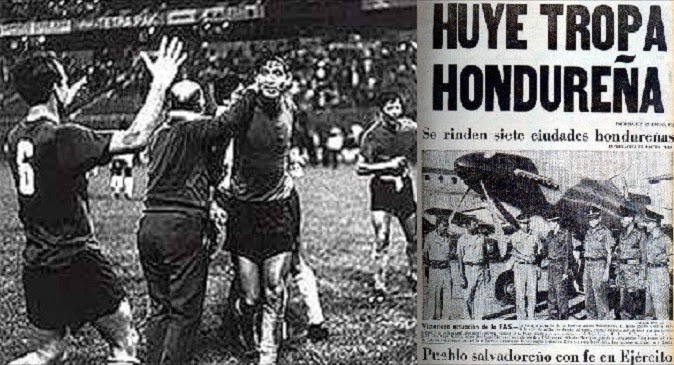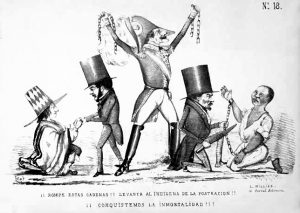
The 1969 play-off match between El Salvador and Honduras (two teams that are not only neighbors but rivals) was filled with anticipation and aggression. This playoff match would decide which nation would be attending the world cup, and which would be staying home. El Salvador and Honduras had each won one match which forced a third, and final, play-off match.1 In the prior matches, fights had broken out between fans in the street and in the stands during the game. But on the day of the final play-off, a much more significant event would take place. The game was scheduled in Mexico City: a third-party country with no bias toward either team. The day of the playoff, El Salvador dissolved all diplomatic ties with Honduras right before the match.
In the first game between the two nations, Honduras won the match 1-0 in its own capital. Some Hondurans stayed outside of the hotel that the El Salvador team had been staying at and threw rocks, set off car alarms and threw firecrackers.2 The 2nd match took place in San Salvador, where the home fans would watch their team win by a commanding score of 3-0. Before the 2nd match took place, the Honduran National team had a security force with them at all times. During the game the security at the stadium was extremely tight with lots of alcohol and weapons confiscated as a security precaution. As the Honduran national anthem played, the home team and fans were extremely disrespectful towards the players and their country. This caused some whiplash for El Salvadorians living in Honduras as their businesses were boycotted and vandalized.3 Leading up to the series of matches, the two nations were in a deep dispute over land reform and immigration. El Salvador was sending its poorest citizens into Honduras so the wealthy could maintain their land.4 El Salvador had a much bigger population than Honduras. Honduras had a population of about 2 million, where as El Salvador had a population of almost 4 million.5

However, they had a significantly smaller amount of land which forced more than 275,000 El Salvadorians to flee into Honduras, causing poverty and crime.6 Honduras accused the El Salvadorians of stealing jobs from the native people of Honduras. But after the 2nd games violence, El Salvador accused Honduras of staying silent while El Salvadorians living in Honduras were raped, murdered, robbed, and oppressed. Neither side was willing to negotiate to the smallest extent, which led to tensions building up even more. In the final match between the two teams, El Salvador won the game in overtime with the score of three to two.7 This caused numerous Salvadorians to be killed in Honduras.8
On July 14th, 1969, almost 3 weeks after the final playoff game, El Salvador bombed targets inside of Honduras. They crippled Honduras by attacking their main airport which left them unable to react to the attack at optimal speed.9 El Salvador then attacked from the ground by marching through the two main roads that connect the countries. Only one day later, the El Salvadorian army had pushed Honduras back over 8 kilometers. The El Salvadorian Army continued to make steady progress. They were nearing the capital city of Honduras, Tegucigalpa, when Honduras finally pushed back. The Honduran Air Force attacked Llopango base. The bombers eventually progressed to Acajutla port, which was important because it was home to El Salvadorian oil refineries. Later that evening huge smoke clouds covered the coast as the the oil refineries were bombed.10
Fearing that the nearing El Salvadorian army would overtake the capital, Honduras called the Organization of American States for help. The Organization of American States (OAS) had an urgent meeting on the evening of July 15th and called for El Salvador to withdraw its troops from Honduras ensuring that its people living in Honduras would not be harmed.11 El Salvador refused, demanding reparations be paid to them and their citizens. El Salvador attempted to further the attack the capital city, but they were unable to proceed with the attack. The previous strike on their oil refineries had destroyed their line of fuels and supplies and they no longer had supplies arriving every other day. Somoza Debayle, the dictator of Nicaragua was also helping Hondurans by arming them with weapons and providing ammunition. The OAS worked night and day in order to provide a cease-fire that would please both parties. Finally, on the night of July 18th, a ceasefire was arranged and became effective two days later.12
Although the cease-fire had been called, El Salvador refused to leave Honduras. They stayed until they were threatened by the OAS with economic sanctions against them. The El Salvador government finally withdrew troops on August 2, 1969. The aftermath of the 100-hour war was anything but slim. More than 2000 civilians were killed, with more than 100,000 immigrants displaced.13 Although they were no longer at war with each other, these two nations peace treaty only came into force on December 10, 1980.14
- Paul Joseph, The SAGE Encyclopedia of War: Social Science Perspectives, 2017 s.v . “Soccer War.” ↵
- Hatcher Graham, Salem Press Encyclopedia, 2013, s.v “Soccer War.” ↵
- Steve C. Ropp, 1982, “The War of the Dispossessed: Honduras and El Salvador, 1969. Thomas P. Anderson.” The Hispanic American Historical Review, no. 2: 296. JSTOR Journals, EBSCOhost (accessed February 5, 2018). ↵
- Richter, Ernesto, John Beverly, Bob Dash, and Irma Fernandez Dash. “Social Classes, Accumulation, and the Crisis of “Overpopulation” in El Salvador” Latin American Perspectives, 7, 1980 ↵
- Ernesto Richter, John Beverly, Bob Dash, and Irma Fernandez Dash. “Social Classes, Accumulation, and the Crisis of “Overpopulation” in El Salvador”, Latin American Perspectives, 7, 1980. ↵
- Charles Clements, Witness to War: an American Doctor in El Salvador (New York; Bantam Book, 1984). ↵
- Hatcher Graham, Salem Press Encyclopedia, 2013, s.v “Soccer War.” ↵
- Charles Clements, Witness to War: an American Doctor in El Salvador (New York; Bantam Book, 1984). ↵
- Charles Clements, Witness to War: an American Doctor in El Salvador (New York; Bantam Book, 1984). ↵
- Charles Clements, Witness to War: an American Doctor in El Salvador (New York; Bantam Book, 1984). ↵
- Charles Clements, Witness to War: an American Doctor in El Salvador (New York; Bantam Book, 1984). ↵
- Charles Clements, Witness to War: an American Doctor in El Salvador (New York; Bantam Book, 1984). ↵
- Charles, Clements, Witness to War: an American Doctor in El Salvador (New York; Bantam Book, 1984). ↵
- Charles Clements, Witness to War: an American Doctor in El Salvador (New York; Bantam Book, 1984); and United Nations -Treaties Series, General Peace Treaty Between the Republics of El Salvador and Honduras, 1980, https://peacemaker.un.org/sites/peacemaker.un.org/files/HN-SV_801030_GeneralTreatyOfPeaceElSalvadorHonduras.pdf. ↵



106 comments
Vania Gonzalez
Rivalries are probably the biggest way of expressing competition between teams. I get that Honduras and El Salvador had a huge rivalry aside from the game of soccer but how this all played out and how riots and fights broke out because of the game is a little too much. It is unbelievable how far some people will go when they’re being patriotic.
Antonio Coffee
I am personally not a huge soccer fan, but many of the people I know are. I knew that soccer rivalries could get intense and even start riots, but I did not know that there have been small wars fought over them. It was strange to read about this because two countries ended up fighting with each other and people died over the results of a soccer game. I worry what that says about us as a race, that we are willing to fight each other over a sports game. I get that many people are passionate about their teams but we can not let others commit crime because of it.
Rebeca Escobar
I understand how passionate some nations are about soccer, but it should never be this serious. It shouldn’t cause a war or cost anyone their lives. This is really sad, and I feel bad for all the people affected negatively by something that shouldn’t have been so serious to begin with.
Leonardo Gallegos
I enjoyed reading this article and it is so unfortunate that people were killed in the process. I believe that this game should have not been a thing to begin with because of the tension that was already created before the game itself. When war and a sport like soccer that involved a lot of passion are collided together then it creates lot of tension among fans and players. Interesting read.
Ryan Estes
This article was a very good read. It was interesting to see how the soccer games fueled the fire that was already burning between Honduras and El Salvador. It is unfortunate that many Salvadorians were killed in Honduras over the outcome of the final match, however. In fact, it is unfortunate that the whole war between Honduras and El Salvador as a whole happened.
Gabrien Gregory
While I understand the possible friendly rivalry-turned-bad scenario, I think there were perhaps many more political implications leading up to the Hondurans and Salvadorians committing such actions against each other. This article provides a small important dialogue for the Organization of American States. Organizations like these truly can and have helped resolved conflict around the region. I can not believe this even happened over such a petty issue, but am equally as surprised to see that it was resolved so quickly and without much military involvement. I enjoyed learning something new by reading this well written article. -Reposted from Aug 30. on WP
Lyzette Flores
Soccer is such a beautiful sport to watch. Growing up, I was raised watching soccer and even attending professional soccer games at such a young age. The love fans have for soccer is so strong. I understand why Honduras was very upset about losing the second match but I see no fit into killing innocent Salvadorians. Just like all sports, all you want is your team to win and nonetheless than that.
Luis Magana
I am a crazy soccer fan so I can understand how everyone felt and how their emotions built up. All the tension eventually built up and the soccer match was the breaking point for both Honduras and Salvador. People were willing to fight for their country. Sometimes one should just think before acting and talk with your head not your emotions because then the end result is something tragic like this. This article was very well written and interesting.
Marina Castro
Very cool to read! As a Honduran, I find it cool when the history of my country is shared among other cultures. I remember my father telling me about this story. It is sad to know that two neighbor countries that share the same culture and language, would turn to war. For a very long time, there was a strong hatred among Salvadoreños and Hondureños.
Katherine Watson
It is so hard to believe that such a beautiful sport could have ended in the lives of many being lost. Although the tensions were high on both ends, I do not see if the match itself was the underlying reason for the war being kicked off (no pun intend). The war itself took almost 3,000 people, and it is tough to fathom that it was predominantly over a match between two countries. Nevertheless, the border tensions and the killing spree sure did not last long compared to other wars, which is a good thing to say at least.